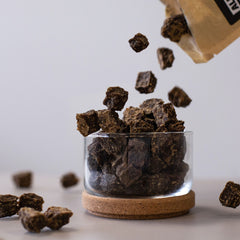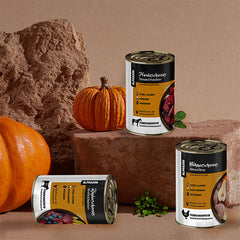Mandarins for dogs: Delicious vitamin bombs or better avoided?
Mandarins are among the most popular citrus fruits and a delicious snack for humans. But what about our four-legged friends? Can dogs eat mandarins? The short answer: Yes, but with caution. Mandarins can be a healthy addition to your dog's diet as long as they are fed in small amounts and prepared properly. In this blog, you'll learn everything you need to know—from the benefits and risks to feeding them safely.
Can dogs eat tangerines? The short answer
Yes, dogs can eat tangerines, but only in small amounts. Tangerines contain many vitamins that can promote your dog's health, but they also contain fruit acids and sugars, which can be problematic in large quantities.
When are tangerines suitable for dogs?
- As an occasional reward.
- To strengthen the immune system (e.g. during the cold season).
- For dogs who like fruit.
The benefits of tangerines for dogs
Mandarins are not only delicious, but also offer several health benefits when eaten in moderation:
1. Rich in vitamin C
- Vitamin C strengthens the immune system and protects against free radicals.
- Especially helpful for dogs weakened by stress or illness.
2. Fiber
- Support digestion and promote healthy intestinal flora.
3. Water-rich fruit
- Mandarins have a high water content and can be a refreshing treat on hot days.
4. Low in calories
- Compared to many other snacks, tangerines are relatively low in calories.
5. Contain antioxidants
- These promote cell health and can have an anti-inflammatory effect.
Possible risks and dangers of tangerines for dogs
Despite their benefits, there are some risks you should be aware of before giving tangerines to your dog:
1. Fruit acids
- The acids in tangerines can irritate your dog's stomach and cause diarrhea or vomiting.
2. Sugar
- Mandarins contain natural fructose, which in large quantities can lead to weight gain or dental problems.
3. Bowl
- The tangerine peel is difficult to digest and may contain pesticide residues. It should always be removed.
4. Cores
- Mandarin seeds contain traces of amygdalin, which can be toxic in large quantities. Remove the seeds before feeding.
5. Allergies or intolerances
- Some dogs are sensitive to citrus fruits. Watch for symptoms such as itching, diarrhea, or vomiting.
How do you properly feed tangerines to your dog?
Proper preparation and feeding of mandarins is crucial to minimize potential risks. Here are some tips:
1. Remove peel and seeds
- The shell and seeds are difficult to digest and should always be removed.
2. Cut into small pieces
- Cut the tangerine into bite-sized pieces to avoid the risk of choking.
3. Use only ripe mandarins
- Ripe tangerines are sweeter and less acidic, which makes them easier to digest.
4. Insert slowly
- When your dog tries tangerines for the first time, give him just a small piece and observe his reaction.
5. Feed in moderation
- Small dogs: 1-2 pieces per week.
- Medium-sized dogs: 3-4 pieces per week.
- Large dogs: Up to half a tangerine per week.
Creative ways to offer tangerines to dogs
Mandarins don't have to be boring! Here are some ideas to make them tasty for your dog:
1. Frozen mandarin orange pieces
- Perfect for hot summer days: Cut the tangerine into pieces and freeze it.
2. Mandarin puree
- Puree the fruit and mix it into your dog's food.
3. Homemade dog treats
- Combine mandarins with oatmeal and yogurt, form small cookies and bake them in the oven.
4. Mandarin water
- Mix a few drops of tangerine juice into your dog's water for a special flavor.
When should you avoid giving tangerines to dogs?
There are situations in which tangerines are not suitable for your dog:
1. Sensitive stomach
- Dogs with sensitive stomachs may be sensitive to the fruit acids in tangerines.
2. Obesity
- Because of the fructose, overweight dogs should not be given tangerines.
3. Allergies or intolerances
- If your dog shows symptoms such as itching, vomiting, or diarrhea, avoid tangerines.
4. Chronic diseases
- If your dog has kidney disease or diabetes, you should only feed tangerines after consulting your veterinarian.
Frequently asked questions about tangerines for dogs
“Can puppies eat tangerines?”
Yes, but in very small quantities and only when they are ripe and seedless.
“Are tangerines poisonous to dogs?”
No, ripe tangerines are safe in small quantities. However, unripe fruits, peel, or seeds can be problematic.
“How do I know if my dog can tolerate tangerines?”
Watch for symptoms like itching, diarrhea, or vomiting after feeding. If none occur, your dog is tolerating tangerines well.
“What alternatives are there to tangerines?”
Apples, blueberries or cucumbers are also healthy snacks for dogs.
Conclusion: Mandarins for dogs – A fruity treat in moderation
Mandarins can be a healthy addition to your dog's diet when prepared properly and fed in small amounts. Key points at a glance:
- Safe: Ripe tangerines without peel and seeds.
- Beneficial: Rich in vitamin C, fiber and antioxidants.
- Caution: Don't eat too much because of the sugar and fruit acid.
With these tips, you can safely and confidently incorporate tangerines into your dog's diet. As an occasional snack, they're a delicious and healthy change!
















